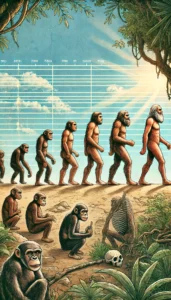 The Scopes Monkey Trial, formally known as The State of Tennessee v. John Thomas Scopes, commenced on July 10, 1925, and became one of the most famous American legal battles of the 20th century. At the heart of the case was John Scopes, a high school teacher accused of violating Tennessee’s Butler Act, a law that prohibited the teaching of human evolution in state-funded schools. Scopes’s decision to teach evolution set the stage for a courtroom drama that would captivate the nation, as it pitted the advancement of scientific thought against legislative restrictions imposed by those who opposed the theory of evolution on religious grounds.
The Scopes Monkey Trial, formally known as The State of Tennessee v. John Thomas Scopes, commenced on July 10, 1925, and became one of the most famous American legal battles of the 20th century. At the heart of the case was John Scopes, a high school teacher accused of violating Tennessee’s Butler Act, a law that prohibited the teaching of human evolution in state-funded schools. Scopes’s decision to teach evolution set the stage for a courtroom drama that would captivate the nation, as it pitted the advancement of scientific thought against legislative restrictions imposed by those who opposed the theory of evolution on religious grounds.
The trial was notable not only for its subject matter but also for the prominence of the individuals involved. Representing the defense was Clarence Darrow, a renowned lawyer and a staunch advocate for civil liberties, while the prosecution was led by William Jennings Bryan, a three-time presidential candidate and a vocal supporter of creationism. The courtroom in Dayton, Tennessee, became a battleground for these two formidable figures, each presenting compelling arguments that highlighted the deep cultural and intellectual divides of the era. The trial was highly publicized, with journalists from across the country covering the proceedings, and it became a spectacle that drew nationwide attention to the debate over science and religion in the educational system.
The Scopes Monkey Trial left an enduring legacy on American society. Although Scopes was ultimately found guilty and fined $100, the trial sparked a broader discussion about academic freedom and the separation of church and state. It underscored the tension between scientific progress and religious conservatism, a theme that continues to resonate in contemporary debates over educational curricula. The trial’s impact extended beyond the immediate legal outcome, influencing public opinion and prompting ongoing legal and educational reforms. Today, the Scopes Trial remains a symbol of the enduring struggle to balance scientific inquiry with religious beliefs in public education.
